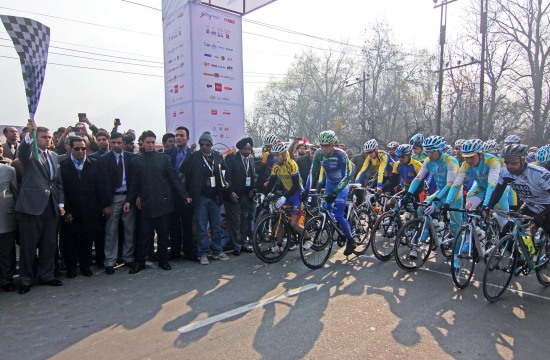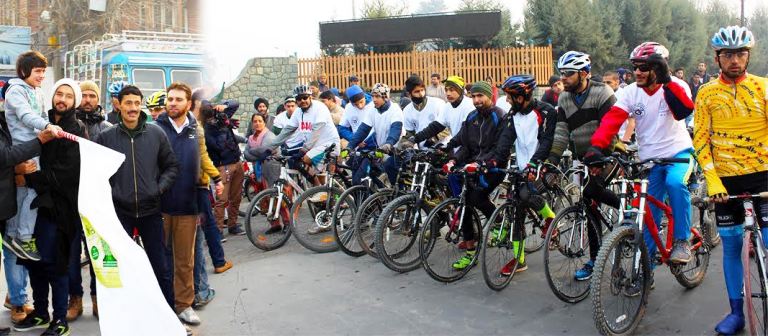by Wajid Aslam Khan
This bondage between T-cell and virally infected cell is called the immunological synapse. It is crucial for the immunological response as this cellular “handshake” activates the T cell.

KL Image by Bilal Bahadur
Our immune system is dependent on the binding of cells together. In scientific terms, this is called an immunological synapse. An infected cell, which is invaded by a virus, starts to display part of the virus – peptide – on a receptor on its surface.
Every T (lymphocyte) cell has a receptor specific for certain peptide. The T cell binds to an infected cell only in the presence of the displayed peptide. This bondage between T-cell and virally infected cell is called the immunological synapse. It is crucial for the immunological response as this cellular “handshake” activates the T cell.
Upon activation, T-cells start to secrete two special proteins – granzymes and perforin. Perforins makes holes into the infected cells and granzymes enter the cell through these holes and induce apoptosis, the cellular death. It is a very dynamic cellular process and the main goal of our immune cell is to kill another cell usually infected or pathogens.
So in this situation, the immune is the key. Here are some facts about our immune response and its boost:
Exercise and Immunity
Feeling tired all the time? You may feel better if you take a daily walk or follow a simple exercise routine a few times a week.
Exercise helps decrease your chances of developing the disease. Studies have shown that exercise increases help to boost your immunity. Regular exercise is one of the pillars of healthy living. It improves cardiovascular health, lowers blood pressure, helps control body weight, and protects against a variety of diseases. It helps to boost your immune system naturally and keep it healthy. Just like a healthy diet, exercise can contribute to general good health and therefore to a healthy immune system.

KL Image: BILAL BAHADUR
Exercise causes changes in antibodies and white blood cells (WBC). These antibodies or WBCs circulate more rapidly, so they could detect illnesses earlier and faster than they might have before when you were on exercising properly. Exercise slows down the release of stress hormones. Some stress increases the chance of illness. Lower stress hormones may protect against illness.
Studies have also shown that people, who follow a moderately energetic lifestyle, benefit most from starting (and sticking to) an exercise programme. A moderate programme can comprise bicycling with your children a few times a week, taking daily 20 to 30 minute walks, going to the gym every other day, playing regularly or any labour work etc.
Please note there is no strong evidence to prove that taking immune supplements without any physical activities lowers the chance of illness or infections or boosts immune).

Exercise Without Enough Diet
Anaerobic training decreased the level of circulating glutamine (a type of amino acid called anti-catabolic amino acid). Glutamine is a crucial source of energy for immune cells and low glutamine is associated with immune-compromising effects. At the beginning of an infection, immune cells need to rapidly proliferate and decreased glutamine results in lower proliferation. Further, low glutamine level hinders the release of certain cytokines, communication chemicals of the immune system.
Although glutamine is a non-essential amino acid if you have enough protein present in the body during the workout, it will not hinder glutamine as indeed helps for the immune system and muscle recovery.
A diet must be taken after any physical activity, which must contain all amino acid profile (essential) like egg whites, rice with chicken or mutton, fish, mix cereals with rice or bread and dry fruits with milk etc.
Stress-Reducing Meditation
A study published in BioMed Central Public Health assessed 5404 responders. It reported that higher scores in self-reported stress measures are associated with more influenza-like infections. So try to mediate yourself, stress degrades your immune response.
Advice: stay determined and enjoy with friends, do your hobby work, go to nature places, spend time with loved ones like family; pets etc. sometimes spiritual things may also help to reduce stress.

Calorie Restriction
Studies have shown that intermittent or periodic dietary interventions can promote cell protection and repair as well as the clearance of damaged cells (autophagy) and intracellular components, in part through the modulation of conserved stress-response or nutrient-sensing pathways. Whereas the dietary- restriction field has mostly focused on the benefits of continuous caloric or macronutrient restriction, here we focus both on the importance of much shorter restriction periods and the re-feeding and post-re-feeding phases, which is accompanied by a regenerative process that is not observed or is much less active during chronic restrictions. We summarize the metabolic and cellular responses triggered by these feeding regimens, their impact on nutrient signalling pathways and their link to age-related diseases.
Advice: Fasting once a week, or fasting for weeks or restricting calories like reducing the amount of daily carbohydrates and fats for 2/3 weeks.
Key Nutrients For Immune System
Vitamin D: The effect of vitamin D supplementation on the prevention of respiratory infection was published in The British Journal of Medicine.
While supplementing people with vitamin D levels below 25 nmol/L shows a very strong protective effect against respiratory infection, in a group with levels above 25 the protective effect is milder.
Advice: Take, sunbathe, drink milk on daily basis.
Vitamin A: Its deficiency is associated with a breakdown of a gut barrier and decreased production of mucous. Foreign particles like LPS can get through such a compromised barrier and induce low-grade chronic inflammation. Further, vitamin A deficiency leads to decreased activity of natural killer (NK) cells. Do you know these T-cells shaking hands with virally induced cells to destroy them? Yes, these T-cells are called cytotoxic T-cells and they are part of the adaptive immune system and it takes them time to proliferate.
Advice: Take green veggies, cauliflower, broccoli, carrots, turnips etc.

Zinc: In a study published in the American Journal of Physiology, zinc deficiency also decreased NK natural killer cells activity, and hinders the proliferation of immune cells and secretion of cytokine IL2.
Advice: cereals, fish, nuts etc.
Vitamins C: The most convincing evidence to date comes from a 2013 review of 29 randomized trials with more than 11,000 participants.

Researchers found that among extremely active people, such as marathon runners, skiers, and troops doing heavy exercise in subarctic conditions, taking at least 200 mg of vitamin C every day appeared to cut the risk of getting a cold in half. Vitamin C is a powerful antioxidant that can strengthen your body’s natural defences.
Antioxidants are molecules that boost the immune system. They do so by protecting cells from harmful molecules called free radicals. When free radicals accumulate, they can promote a state known as oxidative stress, which has been linked to many chronic diseases. Studies show that consuming more vitamin C can increase your blood antioxidant levels by up to 30%. This helps the body’s natural defences fight inflammation
Advice: you can take lemon juice on daily basis, (avoid drinking on an empty stomach), kiwi, guava, etc can be bettered source of Vitamin C.
(A fitness enthusiast, the author is a student currently enrolled at the Department of Bioscience and Bioengineering at the Lovely Professional University Punjab.)















